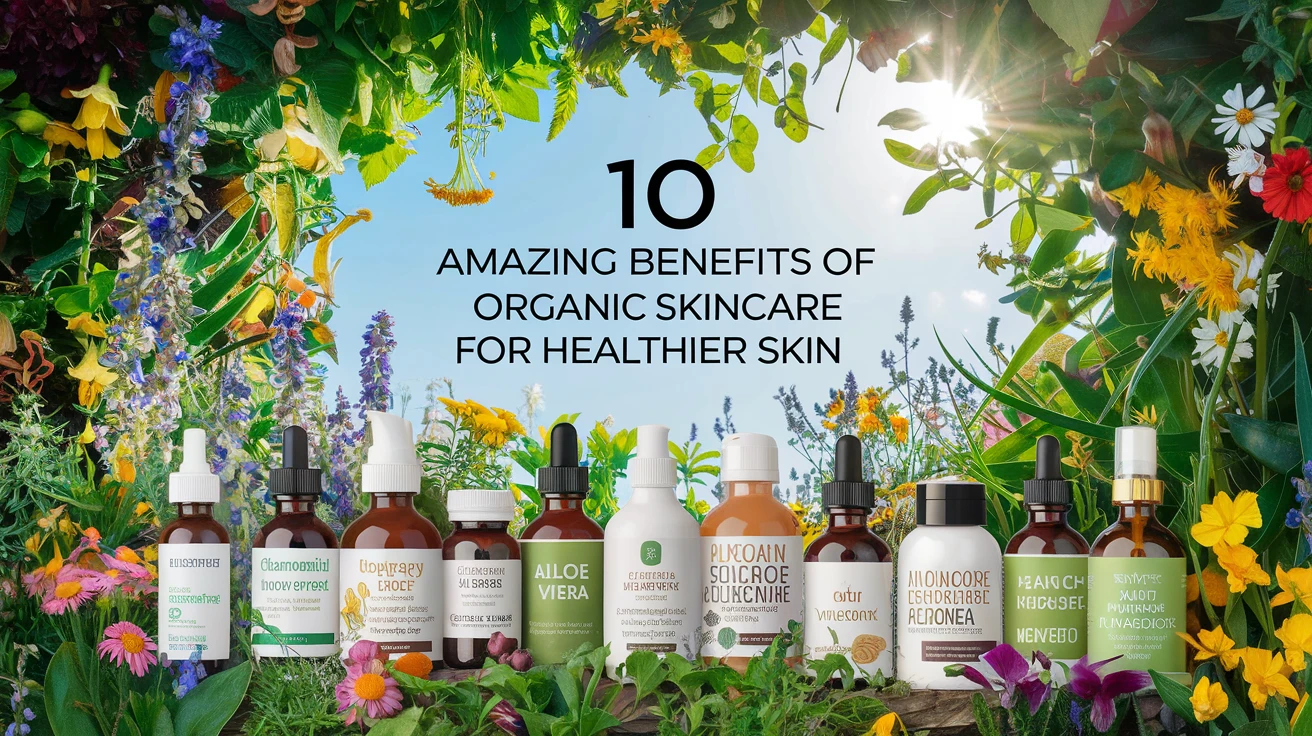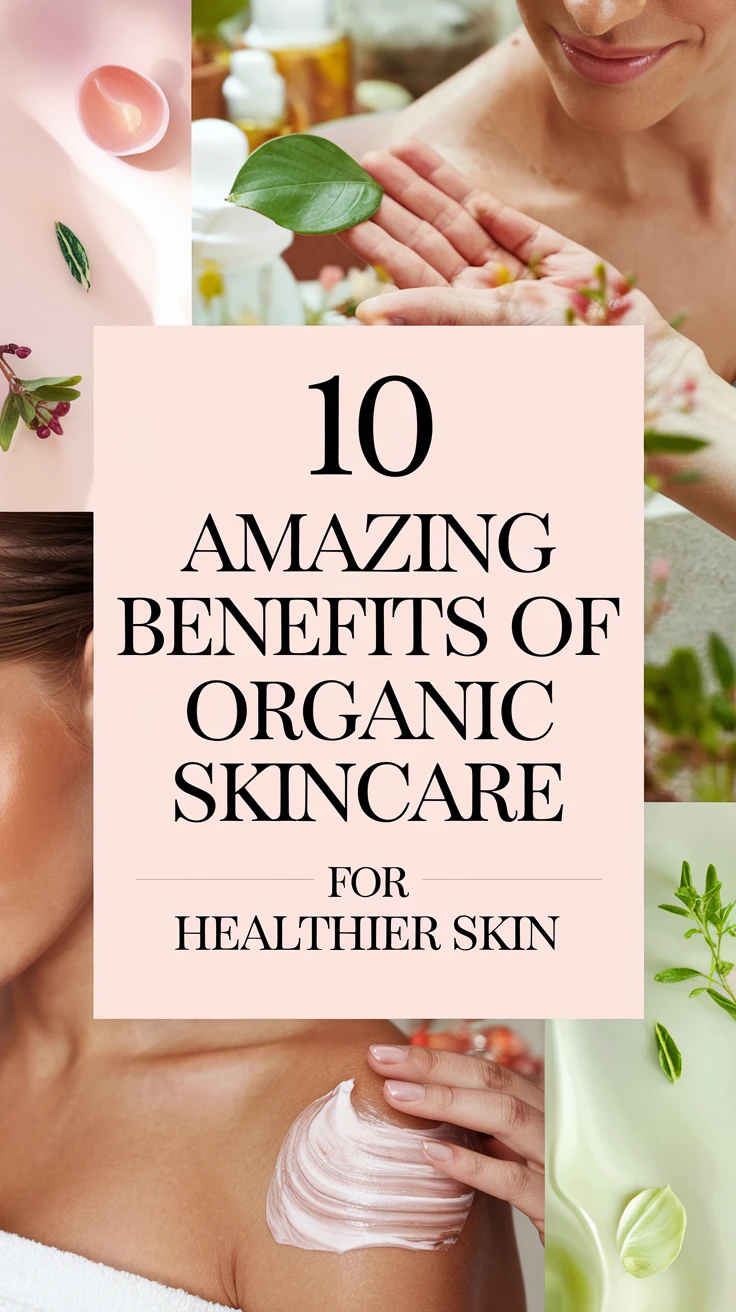
The skincare industry has undergone a remarkable transformation in recent years, with organic products taking center stage in our daily beauty routines. As someone who struggled with sensitive skin and recurring breakouts for years, I’ve personally experienced the game-changing benefits of switching to organic skincare. The journey from using conventional products filled with synthetic ingredients to embracing nature’s bounty has not only transformed my skin but has also changed my entire approach to self-care. In this comprehensive guide, we’ll explore the ten remarkable benefits of organic skincare that could revolutionize your beauty routine and lead you toward healthier, more radiant skin.
Understanding Organic Skincare: What Makes It Different?
Before diving into the benefits, let’s clarify what truly makes skincare “organic.” Organic skincare products are made from naturally grown ingredients without synthetic pesticides, chemical fertilizers, or artificial preservatives. These products typically contain plant-based ingredients, essential oils, and natural minerals that work in harmony with your skin’s natural processes.
Conventional vs. Organic Skincare Comparison
| Aspect | Conventional Skincare | Organic Skincare |
|---|---|---|
| Ingredients | Synthetic chemicals, artificial fragrances | Natural plant extracts, essential oils |
| Production Method | Chemical processes | Sustainable farming, natural extraction |
| Environmental Impact | Higher carbon footprint | Eco-friendly, biodegradable |
| Shelf Life | Extended through preservatives | Natural preservation methods |
The Top 10 Benefits of Organic Skincare
1. Gentle and Non-Irritating
One of the most significant advantages of organic skincare is its gentle nature. Natural ingredients are less likely to cause irritation, redness, or allergic reactions. From my experience helping clients with sensitive skin, I’ve seen remarkable improvements when they switch to organic products, particularly those containing ingredients like chamomile, aloe vera, and calendula.
2. Rich in Antioxidants
Organic skincare products are packed with natural antioxidants that help combat free radical damage. These ingredients include:
– Vitamin C from citrus extracts
– Vitamin E from natural oils
– Beta-carotene from carrot seed oil
– Polyphenols from green tea extract
3. Environmental Sustainability
The production of organic skincare products promotes environmental sustainability through:
– Reduced chemical runoff
– Sustainable farming practices
– Biodegradable packaging
– Lower carbon footprint
4. Better Absorption by the Skin
Natural molecules are more compatible with our skin’s biology, leading to better absorption and effectiveness. This enhanced bioavailability means you often need less product to achieve desired results.
5. Long-term Skin Health
| Time Period | Expected Benefits | Visible Results |
|---|---|---|
| 1-2 weeks | Reduced irritation | Calmer skin texture |
| 1-2 months | Improved hydration | Plumper, more radiant skin |
| 3-6 months | Enhanced collagen production | Firmer, more elastic skin |
6. No Harmful Chemical Residue
Unlike conventional products, organic skincare doesn’t leave harmful chemical residues that can accumulate in your body over time. This benefit is particularly crucial for those using multiple skincare products daily.
7. Aromatherapeutic Benefits
Natural fragrances from essential oils provide additional therapeutic benefits:
– Lavender for stress relief
– Rosemary for mental clarity
– Peppermint for invigoration
– Chamomile for relaxation
8. Support for Skin’s Natural Functions
Organic ingredients work with your skin’s natural processes rather than against them, supporting:
– Natural oil production
– Cell regeneration
– Moisture retention
– Barrier function
9. Cost-Effective in the Long Run
While organic products might seem more expensive initially, they often:
– Require smaller amounts per use
– Prevent future skin issues
– Reduce the need for corrective treatments
– Last longer due to concentrated formulations
10. Holistic Wellness Benefits
The benefits extend beyond skin-deep, promoting overall wellness through:
– Reduced exposure to endocrine disruptors
– Lower toxic load on the body
– Improved skin microbiome
– Enhanced mental well-being through natural aromatherapy
Making the Switch to Organic Skincare
Transitioning to organic skincare requires a thoughtful approach. Here’s what I’ve learned from my personal journey and helping others make the switch:
Essential Steps for Transition
– Start gradually by replacing one product at a time
– Begin with basic items like cleanser and moisturizer
– Read ingredient labels carefully
– Patch test new products
– Document your skin’s response
Common Mistakes to Avoid
– Switching all products simultaneously
– Ignoring individual skin sensitivities
– Assuming all natural products are organic
– Overlooking expiration dates
– Using too many new products at once
Maximizing the Benefits of Organic Skincare
To get the most out of your organic skincare routine:
– Store products properly to maintain their efficacy
– Use products within their shelf life
– Layer products correctly
– Combine with a healthy lifestyle
– Stay consistent with your routine
Conclusion
The switch to organic skincare represents more than just a beauty choice – it’s an investment in your skin’s long-term health and the environment’s well-being. From personal experience and countless success stories, the benefits of organic skincare are clear and compelling. Whether you’re dealing with sensitive skin, looking to age gracefully, or simply wanting to make more conscious beauty choices, organic skincare offers a natural, effective solution.
Key Takeaways
- Organic skincare provides gentle, effective care without harmful chemicals
- Natural ingredients offer better absorption and long-term skin health benefits
- The environmental impact of organic skincare is significantly lower than conventional products
Frequently Asked Questions
How do I know if a skincare product is truly organic?
Look for certified organic labels from recognized organizations like USDA Organic, COSMOS, or EcoCert. Check the ingredient list – it should contain primarily natural ingredients with their botanical names listed.
Are organic skincare products as effective as conventional ones?
Yes, high-quality organic products can be equally or more effective than conventional ones, as they contain concentrated active ingredients that work in harmony with your skin’s natural processes.
Why do organic skincare products cost more?
Organic ingredients are more expensive to produce due to sustainable farming practices, careful harvesting, and natural preservation methods. However, their concentrated nature often means you need less product per use.
How long do organic skincare products last?
Most organic products have a shelf life of 6-12 months after opening. Always check the PAO (Period After Opening) symbol and store products properly to maintain their efficacy.
Can organic skincare help with acne?
Yes, many organic ingredients have natural antibacterial and anti-inflammatory properties that can effectively treat acne while being gentle on the skin.
Is it normal to experience a “purging” period when switching to organic skincare?
Some people may experience a brief adjustment period as their skin adapts to new ingredients. This typically lasts 2-4 weeks and should not be severe.
Can I mix organic and conventional skincare products?
Yes, you can use both types of products, but it’s recommended to transition gradually and monitor your skin’s response to identify what works best for you.
Are all natural skincare products organic?
No, “natural” and “organic” are different terms. Organic products must meet specific certification standards regarding ingredient sourcing and processing.
How should I store organic skincare products?
Store them in a cool, dark place away from direct sunlight and heat. Some products may require refrigeration, especially those without synthetic preservatives.
Can pregnant women safely use organic skincare?
While organic skincare is generally safer during pregnancy, always consult with your healthcare provider and check specific ingredients, as some natural ingredients may not be recommended during pregnancy.


